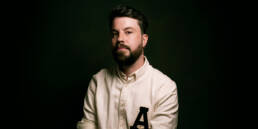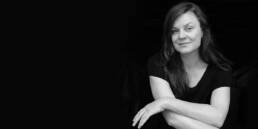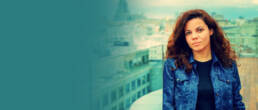
Anna Drubich is a Russian-born composer of both concert and film music, and has studied across Europe and North America. A student at the illustrious Screen Scoring program at the University of Southern California, she began working in Hollywood film as an assistant to composer Marco Beltrami. In our conversation, we discussed her path to composition, her most recent film score, and selecting significant projects that have the power to affect positive change in the world.
You’ve studied music all across the world. You’ve studied music in Moscow, you’ve studied music in Germany, and you’ve been in the United States. How did you end up becoming such a world traveler?
I was born in Moscow and I studied piano performance from when I was a very little kid. I grew up in a very famous film family in Russia. My father, [Sergey Solovyov] who passed away two years ago, was a very famous film director, and my mom [Tatyana Drubich] is an actress and somehow, for me, growing up in Russia was a little bit difficult because as a teenager, I always felt like all my successes were somehow connected to my family’s famousness. I think it was subconscious, but I really wanted to try and study and work somewhere where basically nobody knew the names of my parents. So, when I was seventeen, I moved to Germany to study in Munich at the Academy of Music. It was a fresh start for me and I really loved it, being kind of a no-name person and starting everything from scratch and figuring out if I could actually do something. It was my teenage obsession, so I studied in Germany for classical piano performance and composition. I actually started studying composition earlier in Moscow; my father noticed me writing something all the time and performing some of my music. He asked his very old friend and great composer, Isaac Schwartz, who was a student of Shostakovich, to teach me a little bit of composition. When I was sixteen, I would go to his dacha near Saint Petersburg for the summer, and we would study scores and talk about music. It was mostly educational, like just introducing composition. We were comparing some recordings of Brahms symphonies, like, “Let’s compare recording of [Willem] Mengelberg conducting it to Bruno Walter,” or something. It was very, very inspiring and, you know, my first realization of what’s going on in this world.
When I was seventeen, I moved to Germany. There was a very good composer, Enjott Schneider, and somehow composition was really taking over. Basically, I was not really interested in classical performance and I really was headed into the composition world, and that’s how my first score happened. My father asked me to write a waltz for Anna Karenina with the movie he was shooting by that time, and that was my first composition in film. From then, I started more and more writing for film. While I was studying in Germany, I realized that I wanted to try to work for Hollywood movies, and I applied for the USC (University of Southern California) program, and I got in. I came [to Los Angeles] to study for one year and when I was studying in the program, I met Marco Beltrami, my dear friend and very famous film composer, who actually offered to me to work for him as an additional writer, and that’s how I started.
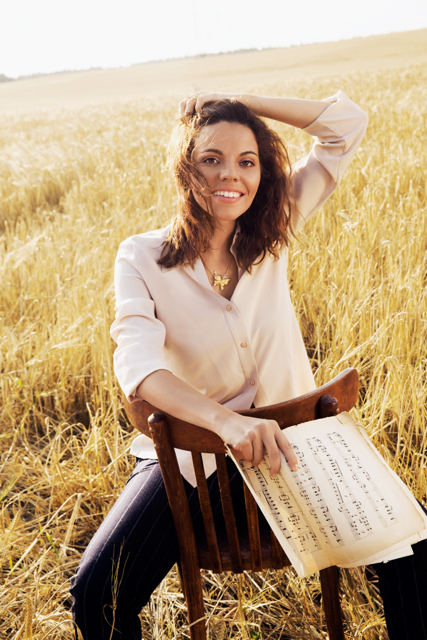 ANNA DRUBICH
ANNA DRUBICH
Wow, that’s a fascinating career arc, to go from, “I’m going to be a pianist,” to. “I want to be a composer,” to, “I like composing, but maybe I’ll go do film,” and not just any films, but Hollywood films.
I’m still writing a lot for the concert world and stuff. I really enjoy writing for film, so I am managing to combine it and I’m very happy with it because me writing only for film would be a little bit frustrating. I feel [the concert] world differently, and they can still influence each other because in a film score, I try to find some parts where I can use all my possible contemporary compositional techniques versus in concert music, I still sometimes manage to have some real melodies.
Is there a lot of sharing of ideas between concert and film music? Do you use ideas in your concert music that maybe weren’t quite as appropriate in film music or vice versa?
Well, it’s not like I think about separating these worlds. When you have this skill of doing [film] music, then it transforms into concert music. In some ways, I use harmonies and I use melodies and they use patterns and all of [these techniques]. I actually had a conversation with Sofia Gubaidulina, the genius composer, and she told me that she was working in the Soviet film music quite a lot, and she wrote some iconic scores for animation films like The Adventures of Mowgli, and this is great music, but used in the film, and she said this is totally okay and great for composers to work in film to create a name and experiment with different stuff. In film music, you sometimes have a decent budget to have an orchestra to play with, so everything is building your skills and techniques and your knowledge about music. She said [scoring films] will always help you when you go to write a big concert music piece. I follow this advice. My other teacher in Germany, Enjott Schneider, told me that he also started writing a lot for film because in the concert world, you write a piece and then you try to figure out who’s going to perform it and if it’s an orchestra, it can take years until it will get its first performance versus in film, where it has a schedule, budget, and deadlines. This is all fast; you write the music and, “Boom,” in a couple weeks, you’re on stage with the orchestra and you hear it performed with great musicians. It’s really great fun for composers.
Do you have any particular influences on your music or is there anyone’s music that you admire, either concert or film?
I listen to a lot of music all the time. It depends on the project I’m working on. For example, now I’m working on a string quartet and I’m listening to different kinds of modern string quartets trying to figure out what can influence me and where I can get ideas from. It’s the same with film music. If I’m like on some sort of genre movie, like an action-thriller, I try to find some composers that always inspire me. I can’t listen to every film composer that exists, but there are some names that I really love their work. Trent Reznor, I love his work. I like the work of Johnny Greenwood. There are some other big-name composers that I really admire and I listen to.
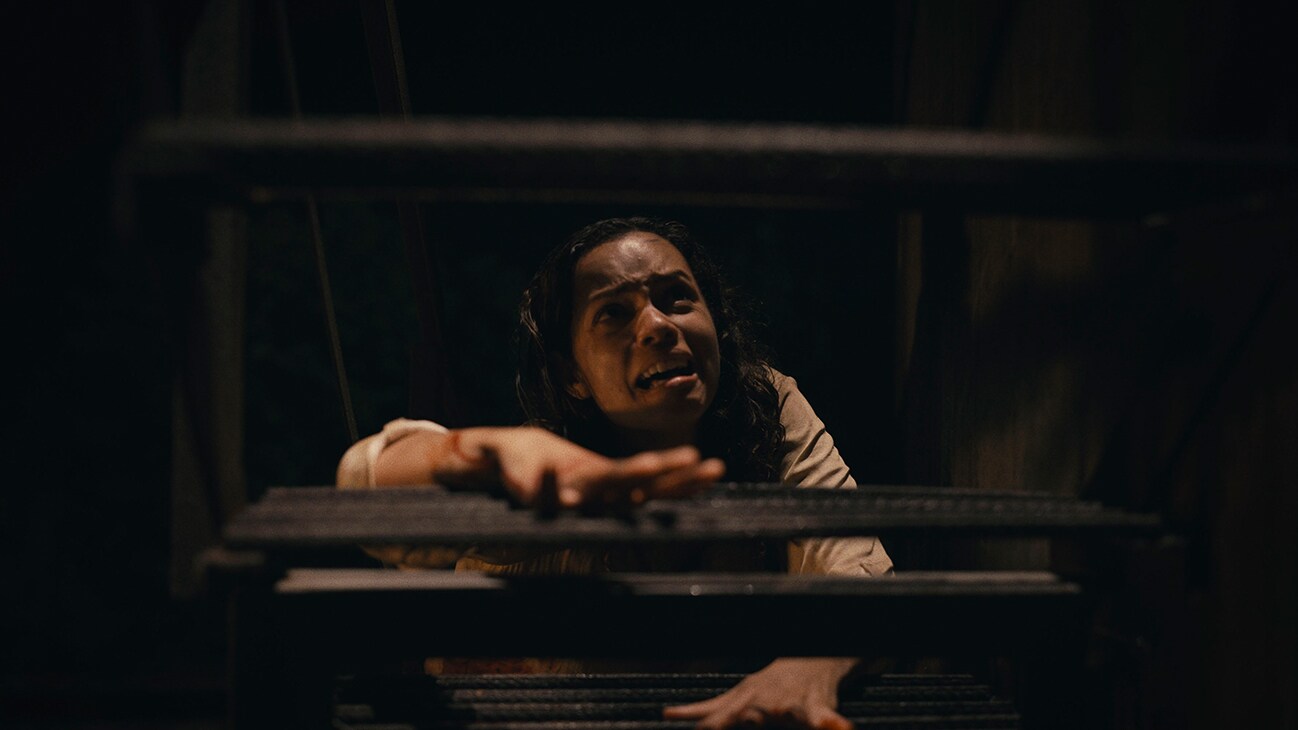 GEORGINA CAMPBELL IN BARBARIAN. PHOTOGRAPH: COURTESY OF 20TH CENTURY STUDIOS
GEORGINA CAMPBELL IN BARBARIAN. PHOTOGRAPH: COURTESY OF 20TH CENTURY STUDIOS
American audiences are a little familiar with your music, particularly from the film Barbarian, which was a sleeper hit a couple years ago, even though it wasn’t very mainstream. What did you enjoy about scoring that type of film that left viewers with such a visceral reaction to so many scenes?
First of all, it was a very talented movie. Sometimes I just like when the director sends me a link to watch it. It was creepy as hell, and I really couldn’t finish watching it because I was like, “Oh my God, this is really scary,” but somehow you just watch it. It’s funny, in some moments, the energy is very lively. It always catches my attention when there is such a brilliant, talented work. I have to say, I was a replacement composer for this movie. They reached out to me when it was like three weeks until the dubs start, so it’s like literally two [weeks to compose], right? The whole score in three weeks was a challenge. I kind of like to have this challenge sometimes: “OK, we have three weeks, here we go,” and because it was the director’s big debut movie, he was really hands on, knowing what he wanted. We discussed every sound, every second where music should [start and] stop. It was very intense because, again, he was sitting with me in the studio for almost two weeks out of the three weeks trying to polish stuff.
It was an exciting project. I created a lot of custom-made sounds for it because the director told me that he really loves all kinds of wood blocks. I recorded and collected all kinds of really weird wooden instruments. I pitched them down, I processed them, and I created loops, like pulses and stuff. This is the stuff I really love doing in any score, but particularly, I think in horror movies, it allows you to create all these very interesting creepy sounds outside-of-the-box, versus a drama [score], which uses more conventional instruments and sounds. [Custom sounds are] what I love about working in horror movies.
I love the fact that you’re able to take some of those objects and manipulate them digitally to get just the right sound. That’s something that we couldn’t do 30 years ago.
No, of course, and I think this is the key nowadays, because I try to [create custom sounds] with every movie I’m on. In the beginning I just try to collect the sounds and mostly create them from scratch, where the sounds will then create the soundscape of this movie. Maybe I will still use violin and cello, but in the background, there will be this custom-made sound that creates a uniqueness to the movie. That’s my approach nowadays.
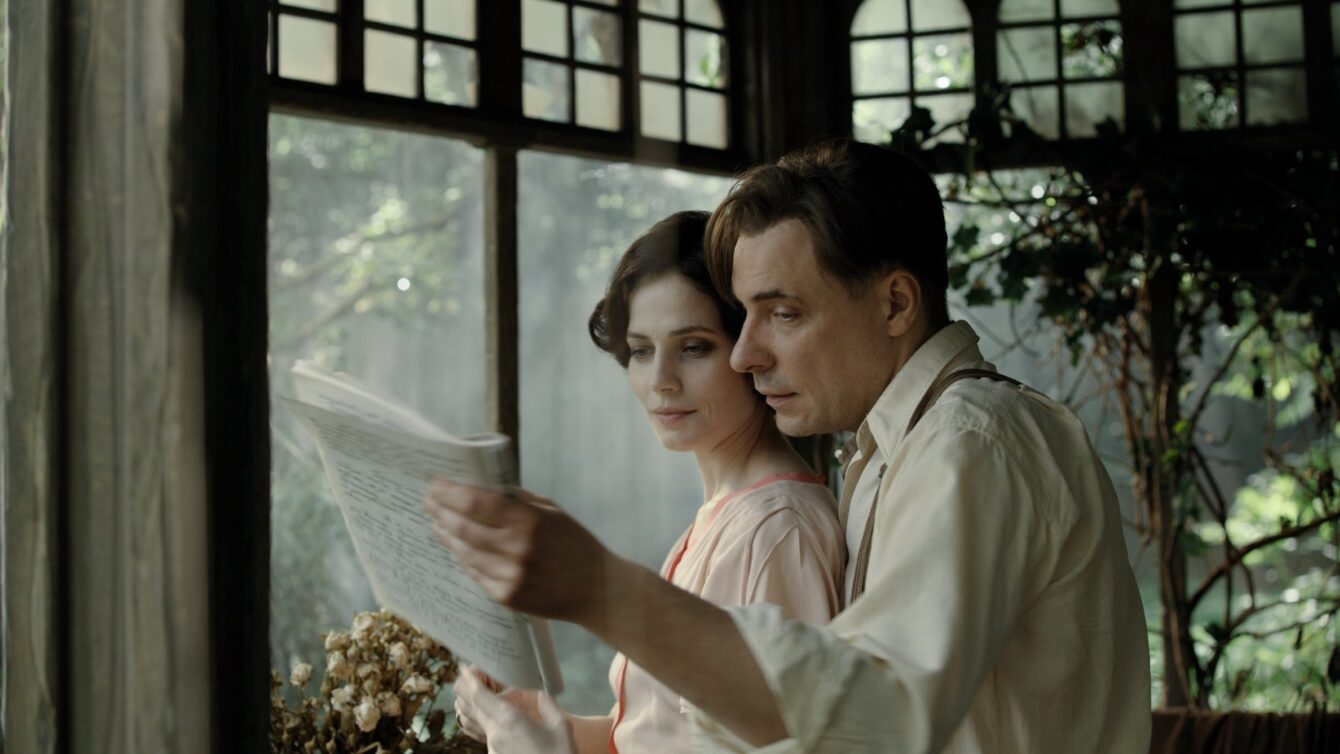 TILL FROM THE MASTER AND MARGARITA
TILL FROM THE MASTER AND MARGARITA
The most recent film that you’ve scored that’s been released is The Master and Margarita, which is a Russian film based on the novel by Mikhail Bulgakov. What was your initial reaction to being asked to participate in this film?
I have to say that when [director] Michael [Lockshin] reached out to me about this movie, it was end of spring 2022, so the war [in Ukraine] was already there and I was tremendously shocked and I decided that I wouldn’t work for Russian projects. It’s not that I don’t want Russian projects, but all the projects that they offered me, like comedies and drama stories, it kind of felt like we are to do all these stories while this big tragedy is happening and nobody talks about it or writes about it. When Michael showed me this movie, this was ironically, the only movie I got to score that was really talking about regime repressions and the whole thing that is unfortunately happening now in Russia. I was blown away with this movie then. Of course, this is a Bulgakov story, which is an absolutely iconic piece for Russian culture, and it is a huge challenge because there have been so many attempts to adapt it in film and music and ballet. Schnittke was writing music for one of the adaptations! The whole context of the story and how the story played nowadays [seemed right].
I started working with Michael, but because of our position in the war and everything, the whole project was stuck a very long time in limbo. Nobody knew if it would be released or not because they ended shooting at the end of 2021 and then the war started [in February 2022] and when the movie had to go to post-production, nobody knew how to finish it and approach it. It took us a year and I was always asking Michael, “Is it actually happening?” We had time and I’m glad we did. I had time to figure out the whole construction of the score, and it’s a very big score. It’s almost two hours of music. It’s a lot of different character lines, a lot of themes. I actually created seven different themes for each of the main characters and storylines. During the film, they somehow develop and cross into each other. They’re always building something, so I always felt like Michael and I were building this huge country of music for the project. We recorded [the score] with a big orchestra, chamber orchestra, jazz band, and choir.
You had mentioned Schnittke since he had scored one of the adaptations of the film that was made in the 1990s, but not really released until almost 2011. Did you listen to that score at all, or did you listen to any of Morricone’s music from the Italian adaptation in the 1970s?
You know what? I did watch and listen to Schnittke’s stuff. I actually didn’t listen to Morricone’s stuff. When I started listening to all these things, I was sharing it with Michael, the director. He was like, “Please stop listening to all this stuff. Please, please stop. We’re doing a different story. Don’t even reread the book because the book is also different from this [movie].” I have to say that his temp score that was in the first draft he sent me was totally different and I could say totally wrong. It actually took me time to figure out what are our themes because there is a special theme for the time that is happening, and then there is a Master theme, and then there is a Love theme which then transforms into the big epic Flight theme.
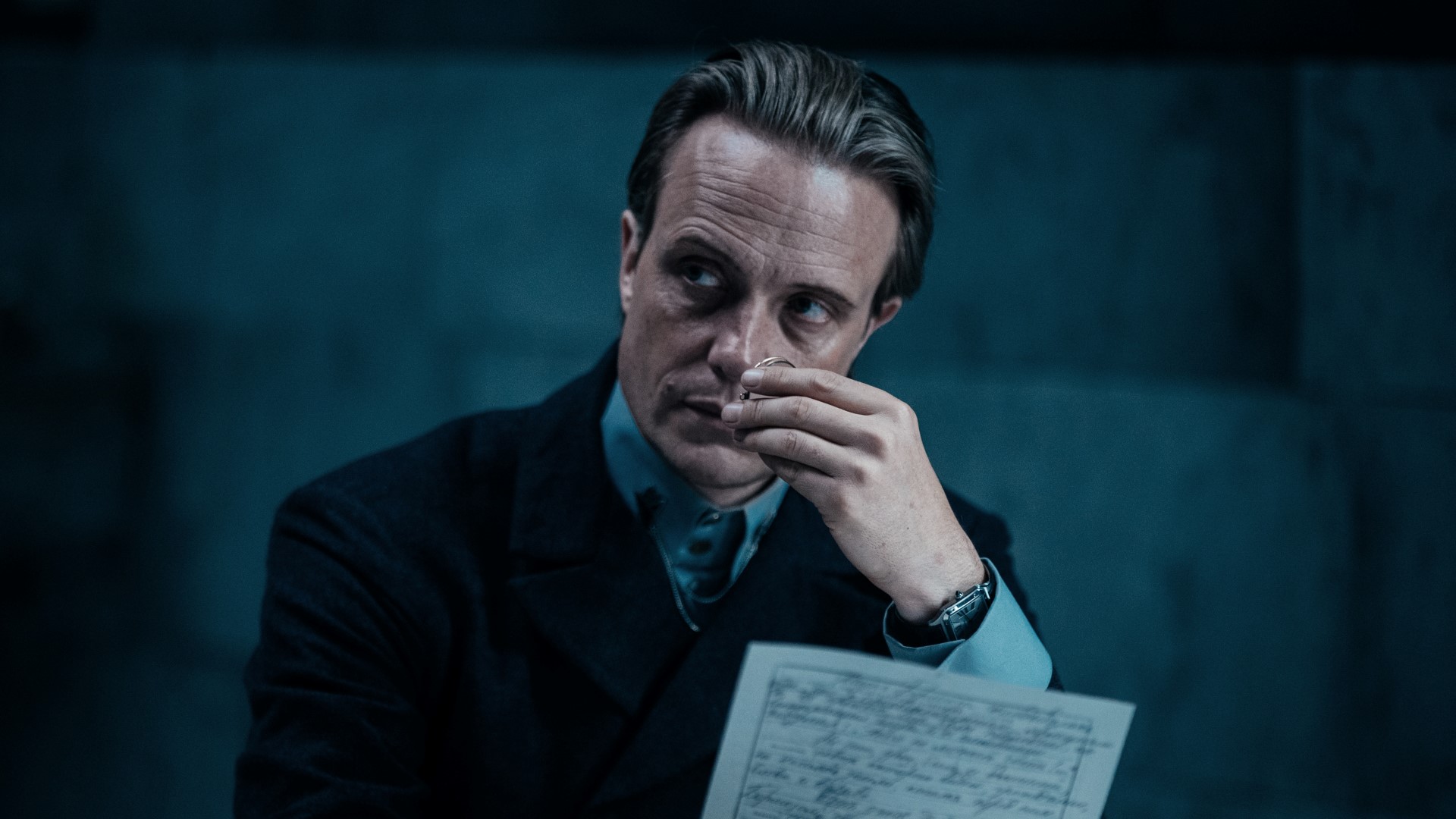 TILL FROM THE MASTER AND MARGARITA
TILL FROM THE MASTER AND MARGARITA
I actually read a lot of articles written by Bulgakov about music. It’s funny because Bulgakov was a very avant-garde writer, but as a music lover he was very, very conservative. He hated Stravinsky’s music and he really loved Charles Gounod, who wrote the Faust opera, which is very romantic, conventional music. Same with Berlioz and the Symphonie fantastique. So, I kind of researched on that level. For example, the majority of Falstaff [author’s note: the opera by Verdi] is based on a kind of operatic gestures and accompanying like we would hear in an opera. There are recitatives, if you know what I mean. But then it transfers to jazz; many people thought that jazz was the devil’s music. Right in the beginning everyone said okay, so we did this, whole intellectual research, which usually is never noticed by the audience. They just think there was some music playing underneath, but I did put some thought into it.
That actually leads me into two questions that I had ready for you. The first one is about the music for [the character of] Woland. He’s, of course, the Devil who comes to visit Moscow. You had mentioned that his theme, or at least his music, is very recitative-like for opera. How did you choose recitative for his style rather than something a bit more dissonant or something even a bit more melodic, since he’s this smooth talker who’s pulling all the strings?
There are several versions of his music. There is one that is a sort of ironic, sarcastic waltz that plays in some moments that this bass line developed from his main motive that is like four notes. When we started working on the movie, we had the major scenes. First, there was a Flight theme, there was a theme for Master meeting Margarita, and there was a conversation of Berlioz and all of them on the plaza. This took us, I don’t know, half a year to figure out just this? We were reinventing and then, like I said, the temp score was not working for Michael, it was not working for me. It was just there to somehow fill out the silence. We really thought what’s the balance from comedy going to sarcasm to insanity to them realizing it’s the Devil, and then going back to reality figuring out he’s not actually real––it’s just in Master’s imagination. It was a whole process and this whole cutting-off- Berlioz’s-head scene was placed to the side. I think it took three months just to do different versions and figure out that we will have this trumpet playing with jazzy improvisations on top of operatic gestures, and then the crazy trumpet plays. We had a very fun and interesting creative process of realizing it.
“When you work as a composer you have a right to choose between projects. I try to choose a project that has some meaning, some importance, some attempt to speak about stuff that is important to speak about.”
This is just for Woland, and then there is a whole development for Pilate’s music and there is a whole development for the Love theme, and the Master theme combines with the Time theme when he is in the hospital and we figure out that they treat him, or torture him, with an electroshock. This is, I have to say, my first complex score where you really work like a Wagner opera with so many Leitmotifs, then they somehow collaborate and evolve. This was the first project where I had this space and this scale of a project that I could try all these big forms.
The jazz band, as you said, the jazz music perhaps representing the devil, or perhaps something that is banned or forbidden in Russia, has a huge role, particularly in the restaurant. How did you decide on the jazz band? And how did you make it American jazz from that time?
Oh, I have to say the song was pre-produced before they started shooting so I didn’t deal with the song. I just did the score, you know? It was Michael’s idea [to include] “Hallelujah,” also based on some of Bulgakov’s work. I don’t really recall. There are so so many little details; Michael and his writer, they really did huge research on the book and there were so many versions of this book and it was unfinished and then the widow [of Bulgakov] finished the book, and were versions where, in the ending, Moscow was on fire and then the original ending where there’s no fire. They created the whole screenplay. It’s not a new story, it’s a much more complex story.
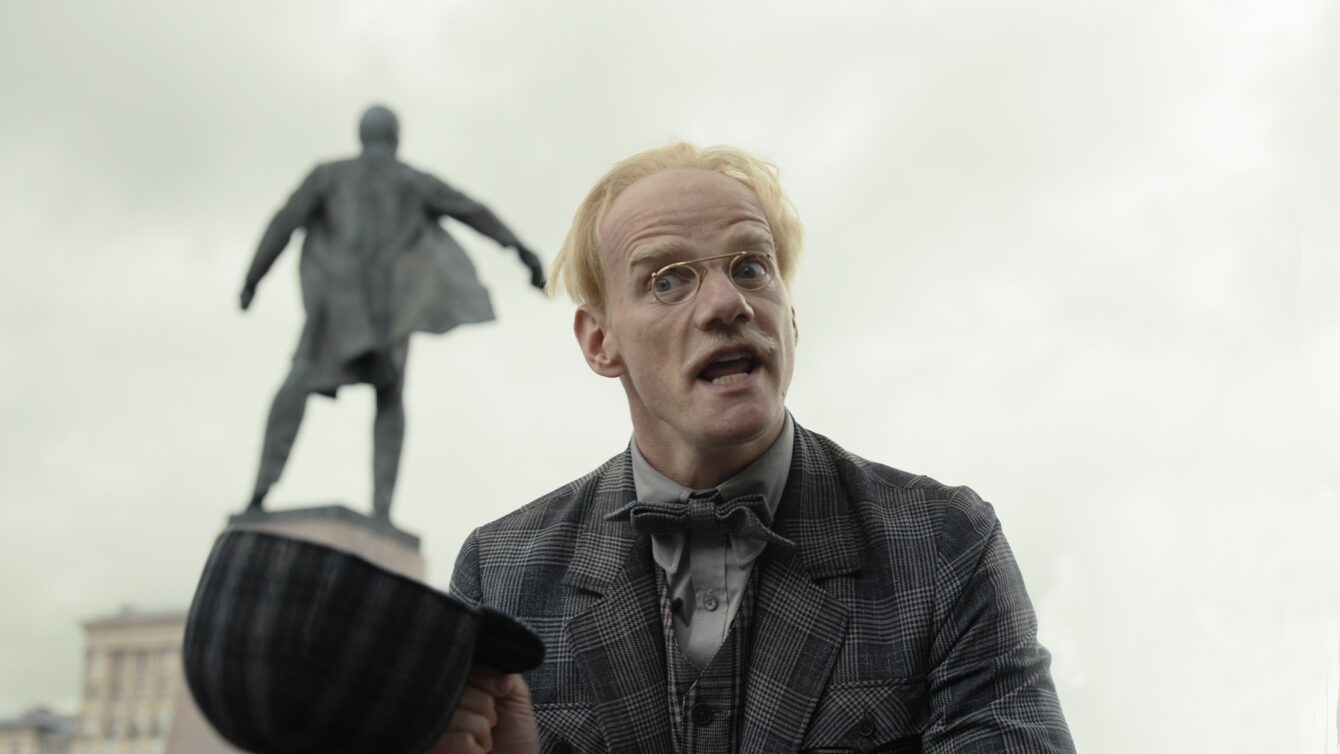 STILL FROM THE MASTER AND MARGARITA
STILL FROM THE MASTER AND MARGARITA
The entrance to the Satanic Ball as Woland is hosting it and Margarita is there greeting everyone. I think this is, perhaps, my favorite part of the film, and my favorite cue as well. Could you talk a little bit about how you came up with the structure of that cue because it feels so different from everything else that’s happening, even though I know [musically] it’s not, but just harmonically and instrumentally it feels different.
We kind of switched back and forth between reality and book and [Master’s] ideas, how he’s going to write it, and this scene is our first integration or dive into the book as it is, so I tried to create this very expected sound of Satan’s Ball where I have choir singing some text in Latin and percussion doing some more marching stuff. I actually have to say this was just a fun cue to write. This is a very straightforward scene, so we don’t have many layers of context.
You’ve done a few other projects, of course. One of the biggest ones that you’ve been involved with was the documentary film on the life of Alexei Navalny, who just recently passed away, and the documentary itself won awards, both the Oscar and the BAFTA for Best Documentary Feature last year. Can you tell us a little bit about that particular project and the type of music that you wrote for that documentary?
Especially now it’s very devastating, this whole story and tragedy and death. Today he was buried in Moscow and so many people came to say goodbye to him. I was approached about this project like two weeks after he was arrested when he came back to Moscow and for many Americans, and I think for the majority of the world, this was a very new story and I noticed all my American friends who watched the documentary [are shocked by] the whole poisoning thing, but for me, being Russian and knowing him for many years as an opposition leader and knowing all his videos that he made about corruption, I totally knew his work and I think he was a real hero. He’s a very controversial person, but I think his last five years, he really became like a Biblical hero.
In the beginning of 2021, he was returning to Russia, so we started working on this documentary and I tried to figure out the theme for this inner force he has. How does it sound? He was always talking about this bright future Russia has, like a free Russia existing in the future, and I tried to imagine with music how it would sound. So, this was my goal. I ended up musically collaborating with an incredible composer, Marius De Vries, and he did a big part of the movie as well. Now, when you realize what happened to him, I don’t know how to describe it. I can’t formulate that.
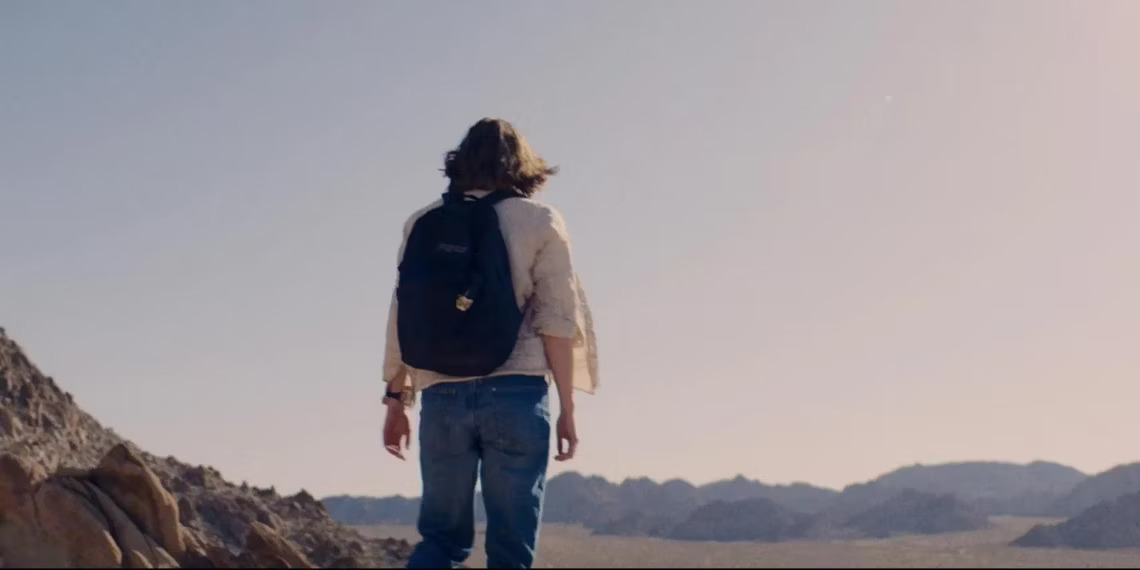 STILL FROM DESERT ROAD
STILL FROM DESERT ROAD
I’m sorry for surprising you with that [question], but it seemed important and I wanted to get your opinions and thoughts on that.
Yes. Somehow, it makes me happier when I think that I am a part of a collaboration. Some projects really mean something or maybe make a difference. I know it’s maybe stupid to say, “Oh, music can change this and political stuff.” When you work as a composer you have a right to choose between projects. I try to choose a project that has some meaning, some importance, some attempt to speak about stuff that is important to speak about.
For example, we can talk about a different project I just finished. I scored a play that was an off-Broadway show called Our Class. It was about the tragedy that happened during the Second World War, where Jewish and Catholic people were living together in a Polish village. When World War II started and the Germans came to this village, the Polish people burned the whole barn packed full of Jews, their neighbors. It’s a real story that happened in 1940-41. I wrote music for this project; these days, I would just really like to work on some meaningful sort of project.
You have a new film coming out that is set to be released within the next couple of weeks titled Desert Road. It’s a hybrid horror/thriller/sci-fi film. Did you get to use some of those horror techniques again, and how did you come up with the musical strategy [for the score]?
It’s a very interesting movie because it is a mix of horror, but also a psychological thriller and dramatic. Eventually we realize that there’s not a real danger there. Everything happens in the main character’s mind and her psychological fight with herself, trying to get out of an inner loop, trying to force herself [out]. I like the movie. I thought the main actress was fantastic. It is a little indie movie that I recently finished and I’m very happy it’s going to be premiered at the South by Southwest Festival on March 10th. For this movie, I had basically the same approach as I do these days: I create the sounds. The whole movie is in the desert, there were no other locations in it. I tried to record the stones and all the stuff that is possible to imagine with this kind of picture and create loops with it, but interestingly, not just shaker stuff, but weird sounds. And once I have this palette, I usually play it to the director and say, “Hey, these are the sounds. This is not the music, it’s just the sounds. What do you think?” I think that directors, even if they don’t have any ideas about music, they always love that something is custom-made for the movie. They just love this idea, like, “Oh, actually you’re really working and not using an existing thing.” I played it to Shannon [Triplett, the director] and she loved it and we started to work with these sounds plus some other musical elements on the score and it is a very talented movie. I think it’s not a straightforward horror or thriller, but it has this mix of elements which makes it interesting and unique.
Erik Heine
Erik Heine is a journalist and musical analyst specializing in film music. He holds a PhD in Music Theory and is Professor of Music at Oklahoma City University, where he has taught since 2005. He is also a member of the International Film Music Critics Association (IFMCA) and writes the thematic and analytical introductions for Chris Siddall Music Publishing and liner notes for various labels.
A Conversation with Adam Janota Bzowski
Adam Janota Bzowski is a London-based composer and sound designer who has been working in film and…
Interview: Rebekka Karijord on the Process of Scoring Songs of Earth
Songs of Earth is Margreth Olin’s critically acclaimed nature documentary which is both an intimate…
Interview: Giorgio Giampà on his approach to scoring The Good Mothers
Canneseries-winning composer Giorgio Giampà dialled in all the way from Guatemala a few weeks back…
Don't miss out
Cinematic stories delivered straight to your inbox.
Ridiculously Effective PR & Marketing
Wolkh is a full-service creative agency specialising in PR, Marketing and Branding for Film, TV, Interactive Entertainment and Performing Arts.
